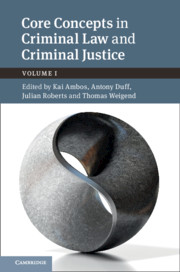‘Core Concepts in Criminal Law and Criminal Justice brings together leading scholars from Anglo-American and Germanic jurisdictions in the attempt to build a ‘common grammar' of criminal law and criminal justice. The insightful collection will be an invaluable point of reference for any researcher in the field.'
Gleb Bogush - School of General and Interdisciplinary Legal Studies, Higher School of Economics, Russia
‘Core Concepts in Criminal Law and Criminal Justice is one of the most serious and promising attempts to build a trans-jurisdictional dialogue between Anglo-American and continental European criminal law scholars. Aimed at exploring the basis for a common grammar in Western criminal law, the book uncovers interesting commonalities and diversities between these legal traditions in their legal frameworks and criminal law theories. To sum up, a must-read book for those who really want to delve into comparative analysis of criminal law.'
Ezequiel Malarino - Università degli Studi di Macerata, Italy
‘If the existence of a global society is defined by the existence of common rules with hardly any local modulations, this book presents the reader with his birth certificate. In fact, the book describes how, in practice, the interpretation and application of common rules operates to face global problems in that part of 21st-century society that is still called the West, beyond the local regulations in which it is supposed to be the most parochial of all areas of law: criminal law. What is the common foundation of punishment for omissions? Who is responsible for crimes, why and to what extent? What is consent as a defence? What is terrorism and how is it punished? Is there a maximum limit to the penalty to be imposed for a crime? What penalty should be imposed on repeat offenders? How are penalties negotiated? What are the minimum rules of due process and what should be done about illicit evidence? All these questions have answers in this book in shared rules, with local modulations more or less important, but that do not cease to be that: hardly spaces in the common rules for local adaptation. In this way, its editors (Kai Ambos, Antony Duff, Julian Roberts and Thomas Weigend) demonstrate that, beyond Brexit and high-flown statements, there will continue to exist a society with shared rules on both sides of the English Channel.'
Jean Pierre Matus Acuña - Universidad de Chile
‘This is an ambitious opening foray in an exciting project, which is both comparative and conceptual. Rather than simply comparing legal practices, each chapter uses comparative inquiry to excavate underlying theoretical and philosophical assumptions and perspectives. This project offers new ideas and new frameworks that can enliven thinking within different communities of criminal law theory.'
Darryl Robinson - Queen's University, Ontario
‘This is a project that is wonderfully conceived. International criminal law has, as the editors say, in spite of English increasingly become the lingua franca of international criminal law, often beset by linguistic misunderstandings, where concepts that sound the same are, in fact ‘false friends'. This work, therefore in seeking to foster a trans-linguistic and analytic approach to core concepts in international criminal justice is one that can be warmly applauded. The editorial team behind it reads very much as a ‘who's who' of international criminal law, and the outstanding quality of the chapters it contains is testament to their dedication to such an important project.'
Robert Cryer - University of Birmingham
‘The book Core Concepts in Criminal Law and Criminal Justice: Anglo-German Dialogues provides us with an opportunity to look at the boundaries of criminal liability from comparative perspectives, and to evaluate the considerations that justify the extension of criminal liability …’
Miriam Gur-Arye
Source: Israel Law Review



